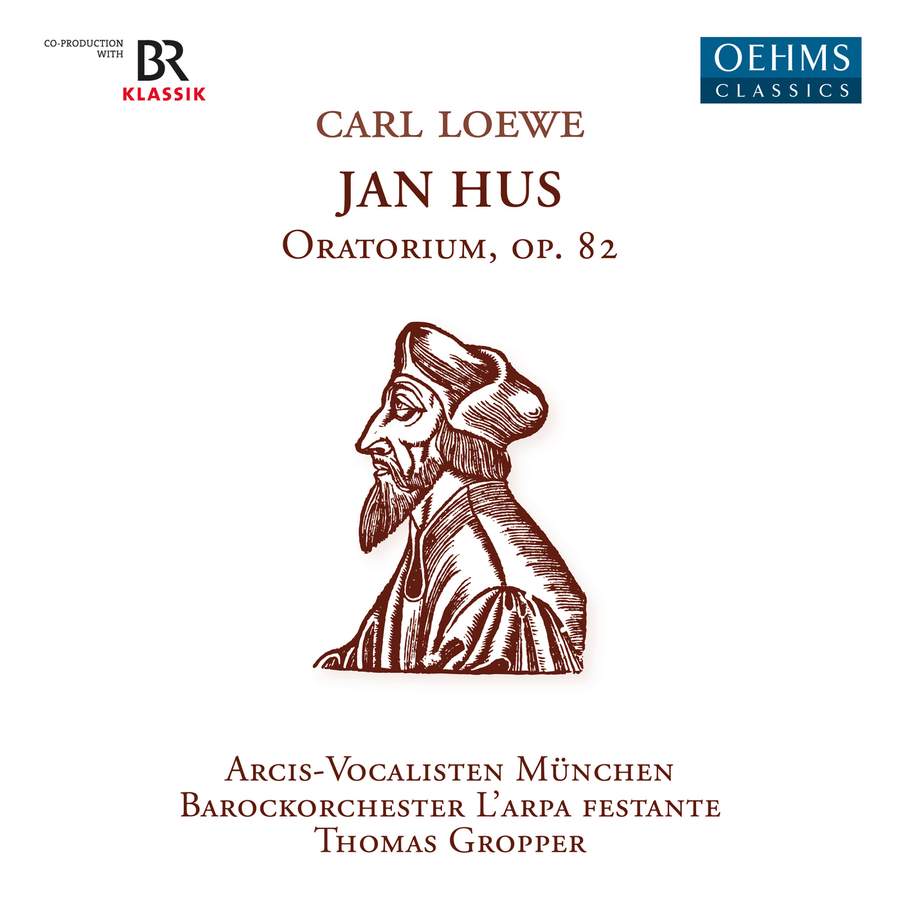LOEWE Jan Hus
View record and artist detailsRecord and Artist Details
Genre:
Orchestral
Label: Oehms
Magazine Review Date: 10/2023
Media Format: CD or Download
Media Runtime: 93
Mastering:
DDD
Catalogue Number: OC1720

Tracks:
| Composition | Artist Credit |
|---|---|
| Jan Hus |
(Johann) Carl (Gottfried) Loewe, Composer
Arcis Vocalisten Dominik Wörner, Bass Georg Poplutz, Tenor L'Arpa Festante Ensemble Monika Mauch, Soprano Thomas Gropper, Conductor, Bass Ulrike Malotta, Contralto |
Author: Jed Distler
Although Carl Loewe’s reputation today lies within his prodigious output of songs and ballads, his long career as a church musician yielded a number of oratorios, including Das Sühnopfer des neuen Bundes (‘The expiatory sacrifice of the New Covenant’), Hiob (‘Job’) and, possibly best of all, Jan Hus, which receives its premiere recording here. Based on a libretto by August Zeune and premiered in 1841, the work was largely forgotten until a 2013 performance of the piano/vocal score.
Over 100 years before reformer Martin Luther emerged, the preachings and writings of the oratorio’s protagonist similarly criticised the Catholic Church’s abuse of power and claims to represent its teachings as the absolute truth. The Council of Constance tried, condemned and convicted Hus for heresy, and on July 6, 1415, he was burnt at the stake. Loewe’s flair for drama and emotional contrast often blurs the line between oratorio and opera. The brooding introduction that foreshadows the work’s tragic denouement leads right into an upbeat student chorus. Upon learning that he has been summoned to the Council of Constance, Hus reacts with calm, despite the concern of his colleagues, his wife Sofia and King Wenceslas. The latter two and Hus converge in a gorgeously wrought Terzett that ends the oratorio’s first part on a gentle and hopeful note. Part 2 brings us to our hero’s journey to Constance, highlighted by several numbers that feature a chorus of vigorously vocalising gypsies and some of Loewe’s punchier orchestral touches, replete with emphatic percussion.
Part 3 features the work’s most overtly operatic music, from the expressive aria ‘Augen sind der Seele treuer Spiegel’ (sung by Barbara, the German King’s wife) and Hus’s intense solo soliloquy to the ironically gentle chorus describing Hus’s final path to the place of execution. A true oratorio ambience manifests in the concluding choral fugue, which might be described as Handelian in style but Beethovenian in spirit.
The singers bring both words and music to vivid life. Tenor Georg Poplutz navigates Loewe’s long phrases with warmth and a sense of inner calm that befits his character. Soprano Monika Mauch does impressive double duty; she conveys both worry and unconditional love for her husband, while also darkening her timbre to match Barbara’s scheming nature. Bass Dominik Wörner similarly alters vocal character to suit both good and bad kings as well as the steadfast loyalty of Hus’s friend Hieronymus. Thomas Gropper is the performance’s mastermind on every level. He elicits clear and articulate results from his choral forces, while the orchestra’s forward woodwinds and pungent brass underline the variegated efficiency of Loewe’s scoring. Gropper also gets to sing a cameo role as the shepherd who gives Hus milk for the road at the end of Part 2. There are English translations for Gropper’s scholarly annotations and plot synopsis but the libretto is in German only.
Discover the world's largest classical music catalogue with Presto Music.

Gramophone Digital Club
- Digital Edition
- Digital Archive
- Reviews Database
- Full website access
From £8.75 / month
Subscribe
Gramophone Full Club
- Print Edition
- Digital Edition
- Digital Archive
- Reviews Database
- Full website access
From £11.00 / month
Subscribe
If you are a library, university or other organisation that would be interested in an institutional subscription to Gramophone please click here for further information.




